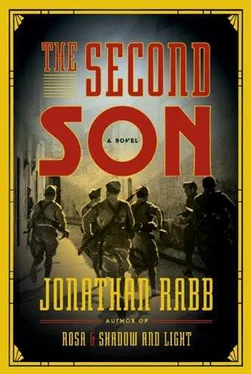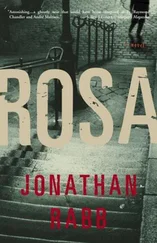Jonathan Rabb - The Second Son
Здесь есть возможность читать онлайн «Jonathan Rabb - The Second Son» весь текст электронной книги совершенно бесплатно (целиком полную версию без сокращений). В некоторых случаях можно слушать аудио, скачать через торрент в формате fb2 и присутствует краткое содержание. Жанр: Политический детектив, на английском языке. Описание произведения, (предисловие) а так же отзывы посетителей доступны на портале библиотеки ЛибКат.
- Название:The Second Son
- Автор:
- Жанр:
- Год:неизвестен
- ISBN:нет данных
- Рейтинг книги:4 / 5. Голосов: 1
-
Избранное:Добавить в избранное
- Отзывы:
-
Ваша оценка:
- 80
- 1
- 2
- 3
- 4
- 5
The Second Son: краткое содержание, описание и аннотация
Предлагаем к чтению аннотацию, описание, краткое содержание или предисловие (зависит от того, что написал сам автор книги «The Second Son»). Если вы не нашли необходимую информацию о книге — напишите в комментариях, мы постараемся отыскать её.
The Second Son — читать онлайн бесплатно полную книгу (весь текст) целиком
Ниже представлен текст книги, разбитый по страницам. Система сохранения места последней прочитанной страницы, позволяет с удобством читать онлайн бесплатно книгу «The Second Son», без необходимости каждый раз заново искать на чём Вы остановились. Поставьте закладку, и сможете в любой момент перейти на страницу, на которой закончили чтение.
Интервал:
Закладка:
A man, small with gray hair, stood in a shirt, trousers, and suspenders. His left arm and hand were shriveled by disease. The fingers reached only to his waist, and the rest hung limp at his side. He leaned his head out the doorway and peered down the street, as if he was expecting to see others. He stepped back and looked up at Hoffner. He spoke with caution. “The fighting has started?”
“No,” said Hoffner. “Where is the German?”
The man continued to stare. “You have the wrong house.”
“No.” Hoffner spoke in German. “I have the right house. I don’t care about the guns. I want only the German.”
The man waited and then said, “I don’t understand this language.”
“I can find a few militiamen at the gate to translate for you. Shall I go get them?”
It was clear why the men of Hisma had picked this Spaniard. He remained unflappable. He waited another few moments and then pulled the door fully open and motioned Hoffner in.
The hall was narrow and dimly lit, with stairs at the side leading up into the shadows. The man led Hoffner beyond them, into a room at the back. It held a few wooden chairs, a low table, and something that had once been a rug. The place had the smell of wet towels left too many days moldering in a corner.
Hoffner looked over and saw the man holding a small pistol in his good hand. It was aimed at Hoffner’s chest.
Hoffner said, “Is the German here?” The man remained absolutely still. Hoffner said, “I’ve told you I don’t care about the guns.”
“Take your pistol out and place it on the table.”
Hoffner removed his pistol and set it down. “The German-is he here?”
“I don’t know about any guns.”
Hoffner stared back. What else was the man going to say?
“He’s told you he comes from Berlin,” said Hoffner. “That he’s part of Hisma, Hispano-Marroqui. He isn’t. He lied.”
The man continued to stare, and Hoffner looked around for a chair. He found the least uncomfortable one and sat.
They waited like this for perhaps a minute before Hoffner said, “I’m not sure what the sound of a bullet would do right now, but I’m thinking you’re not that eager to find out.”
He located the source of the smell. It was a rope mop propped against the wall, standing in a pool of oily water.
Hoffner said, “Yague will be here in the next few hours. He’ll take the city. He’ll thank you for the guns, and you’ll march around with him and point to the people who’ve done you and your little arm the most cruelty. Then you’ll watch him shoot them, all for your Spain. I don’t care one way or the other. I want the German. I want my son.”
The man’s eyes widened for just a moment as gunfire erupted in the distance. It was pistols and rifles. The man turned his head and listened intently. The fighting continued to build as mortars began to explode. He looked at Hoffner. “The sound of one bullet wouldn’t make much of a difference now, would it?”
Hoffner tried not to think of Mila. He shook his head easily.
“You say he’s your son.” Hoffner said nothing, and the man continued. “He told me he was forced to burn his papers. It was too dangerous to keep them in the Republican zone.”
“He never had any papers. You should clean that mop.”
“He knew important names.”
“Sanz in Teruel, Doval in Zaragoza.”
The man hesitated.
Hoffner said, “Obviously I know them as well. He isn’t here to help you. You need to believe me. When does he come back to the house?”
The man kept the gun raised.
Hoffner said, “Does he know where the crates with the guns are hidden?”
This seemed to snap some life into the face. The man waited and then shook his head.
“Good,” said Hoffner. “Then he’ll need to come back. You shouldn’t be here when he does.”
It was clear the man was running through the last few minutes, making sure he hadn’t missed anything. Yague might be at the gates, but he wasn’t inside them just yet. Slowly the man brought the pistol down and slid it into his belt.
“If you try and follow me,” he said, “I’ll shoot you. If you try and leave, I have someone who watches the house who will also shoot you. You understand?”
“Which room?” Hoffner said.
The man showed a last moment of indecision before saying, “Top floor. The attic room.”
Hoffner stood. He picked up his pistol and moved to the door.
It was hours of waiting under a row of slanted beams. There was room enough for a bed, a bureau, and an open window that peered out to the south and brought the sounds of killing up through the streets.
Hoffner had found a little alcove behind one of the beams. Mercifully it was out of the sunlight. He sat in a chair with a glass of water-two or three days old-but the heat was too intense not to drink. There was no door, just the stairs, climbing up through a breach in the floorboards. Two pictures hung in simple frames behind the bed, the Madonna gazing out and a saint pensive at his desk. There had been no attempt to hide them. Such was the faith in Yague and his troops.
Hoffner listened from his perch. The sound of gunfire crackled like oil in a hot pan. Had he been able to block out the screams and the shouts, he might have imagined himself on a summer night in Wannsee, the sky wild with lights and a warm explosion of fireworks from above. But the screams and the shouts continued. It was a time without feeling, without memory. All Hoffner had was the image of Sascha standing by that well. It waited with him.
He heard him first on the floor below, then on the stairs. Hoffner sat very still and turned his head. He remained obscured behind the beam as he stared across the room.
Sascha emerged through the opening. He had shaved, and what hair there was lay slick across his scalp in stray lines of black and gray. He was bone thin in a peasant shirt and pants, and his face was red with blotches from the heat. He carried a bag. He set it down before walking toward the window. He leaned out and peered across the city.
Hoffner found it oddly peaceful watching his son. He tried to see something he knew of the boy, in the posture or the gaze, but there was nothing. Hoffner set down his glass and said, “Hello, Sascha.”
Sascha turned, a quick movement though not sharp, and his eyes settled on his father. Whatever surprise he felt he kept to himself. He continued to stare.
Hoffner said, “You look well.”
Sascha said nothing.
“Did you kill him?”
Sascha’s eyes narrowed. It was the only hint of recognition. He saw the pistol on his father’s lap. “Are you intending to use that?”
Hoffner waited. He shook his head.
“I didn’t kill him.”
“You’re lying.”
There was something so broken-down in the way Sascha stared. It was as if all his strength lived in the tightness of his jaw, his narrow shoulders taut and high against the neck. Were he to release, he might have collapsed or wept, although Hoffner couldn’t recall even a moment’s tears from the boy.
Hoffner said, “You left the film. In Coria.”
“Yes.”
“So I would see it.”
“When it went back to Berlin. Not here.”
“What a stunning act of kindness.”
“And yet you’re here.”
Hoffner tried not to see the hatred in the eyes. “Do you ever ask yourself what you’ve become, Sascha?”
Hoffner expected anger or accusation, but Sascha showed neither. Instead, he turned slowly to the window and stared out.
Sascha said easily, “They’ll be breaching the wall soon. You can hear the grenades. They’re actually close enough to be throwing grenades. They’ll have to climb over their own dead to get to it, but they’ll take the wall.” He stared and listened and said, “You think I killed my brother.”
Читать дальшеИнтервал:
Закладка:
Похожие книги на «The Second Son»
Представляем Вашему вниманию похожие книги на «The Second Son» списком для выбора. Мы отобрали схожую по названию и смыслу литературу в надежде предоставить читателям больше вариантов отыскать новые, интересные, ещё непрочитанные произведения.
Обсуждение, отзывы о книге «The Second Son» и просто собственные мнения читателей. Оставьте ваши комментарии, напишите, что Вы думаете о произведении, его смысле или главных героях. Укажите что конкретно понравилось, а что нет, и почему Вы так считаете.












